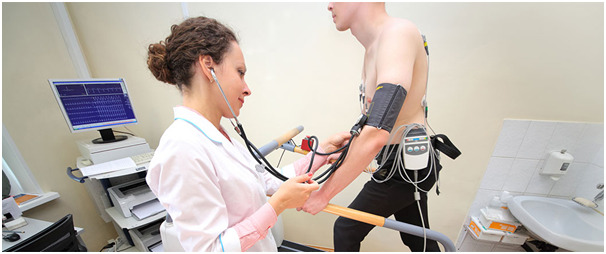Exercise Stress Testing

An exercise stress test, also called a cardiac stress test, exercise ECG or stress test, is used to assess the range of ability of the heart. The idea of an exercise test is to objectively assess how well the heart functions during increased activity. It is a very good way to assess if the heart is healthy.
A stress test is a type of test used to determine how the heart responds to exertion, or stress caused by exercise. Stress tests can be used to help diagnose a problem with the heart's structure or function, to evaluate blood flow to the heart and to determine the effectiveness of treatment.
Most stress tests are performed using a treadmill or an excercise bicycle. In this test, your heart is evaluated using an electrocardiogram while you're walking on a treadmill. The speed and incline of the treadmill will go up gradually.
During the test you are carefully monitored to see what your heart rate and your blood pressure is doing. We also record the electrical activity of the heart through an ECG. An exercise treadmill test typically goes on for a maximum of 12 minutes. The average duration someone will walk for is around nine minutes.
Sometimes, medicine is used to increase the heart’s activity instead, for example in patients who cannot walk very well. This type of stress test may also be combined with imaging of the heart to physically see how well the heart is pumping. The imaging may be done with an ultrasound (called a stress echo) or MRI (called a stress MRI) or a nuclear scan (called a stress nuclear scan). The principle of all these tests is the same – to increase the workload of the heart and carefully monitor your blood pressure, heart rate and heart function.

